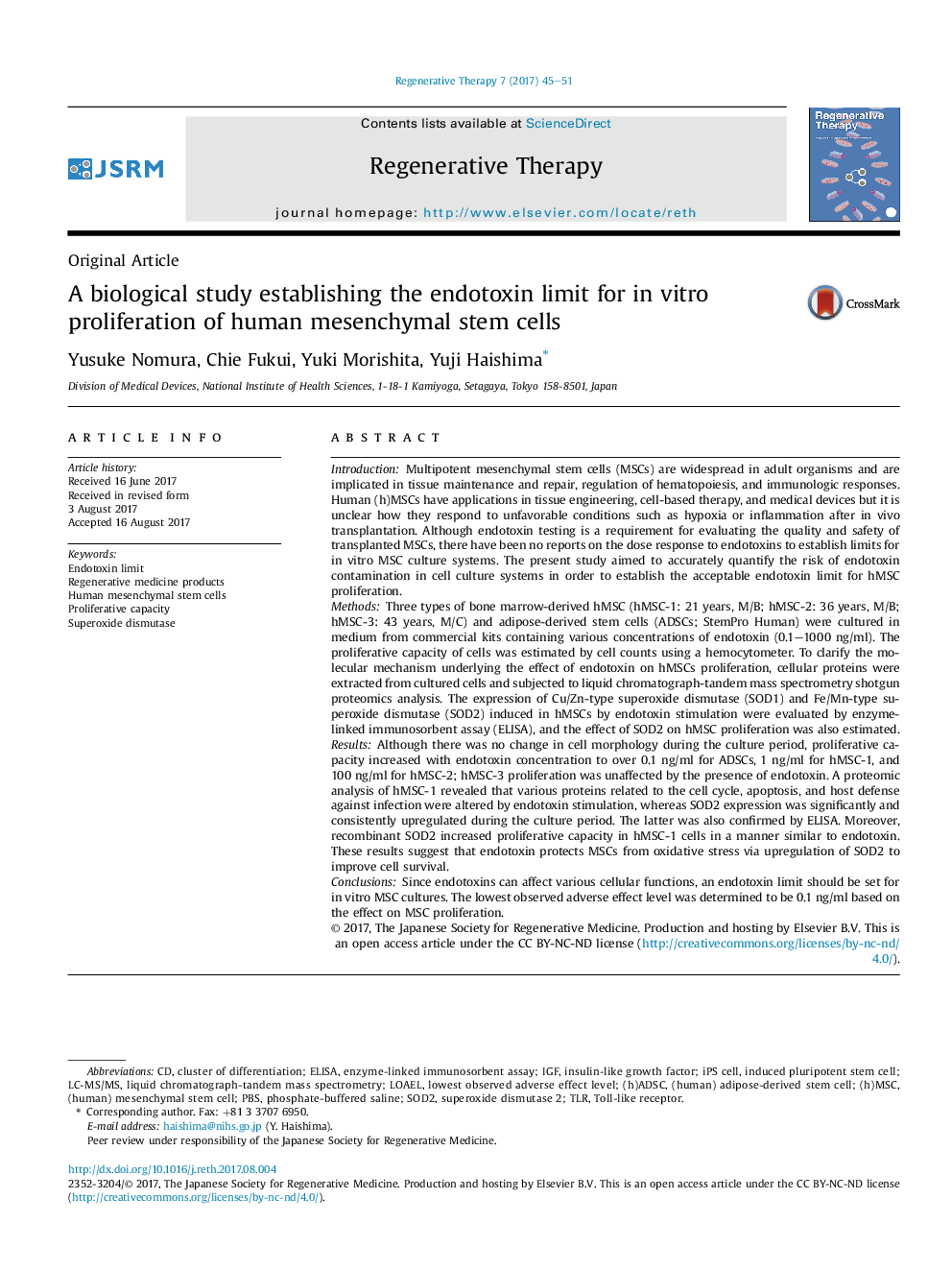| کد مقاله | کد نشریه | سال انتشار | مقاله انگلیسی | نسخه تمام متن |
|---|---|---|---|---|
| 5516186 | 1542359 | 2017 | 7 صفحه PDF | دانلود رایگان |
- Risk of endotoxin contamination in an hMSC culture system was quantified.
- Endotoxin increased proliferative capacity of hMSCs.
- SOD2 has similar effects of hMSC proliferation as endotoxin.
- Lowest observed adverse effect level of endotoxin was determined as 0.1Â ng/ml.
IntroductionMultipotent mesenchymal stem cells (MSCs) are widespread in adult organisms and are implicated in tissue maintenance and repair, regulation of hematopoiesis, and immunologic responses. Human (h)MSCs have applications in tissue engineering, cell-based therapy, and medical devices but it is unclear how they respond to unfavorable conditions such as hypoxia or inflammation after in vivo transplantation. Although endotoxin testing is a requirement for evaluating the quality and safety of transplanted MSCs, there have been no reports on the dose response to endotoxins to establish limits for in vitro MSC culture systems. The present study aimed to accurately quantify the risk of endotoxin contamination in cell culture systems in order to establish the acceptable endotoxin limit for hMSC proliferation.MethodsThree types of bone marrow-derived hMSC (hMSC-1: 21 years, M/B; hMSC-2: 36 years, M/B; hMSC-3: 43 years, M/C) and adipose-derived stem cells (ADSCs; StemPro Human) were cultured in medium from commercial kits containing various concentrations of endotoxin (0.1-1000 ng/ml). The proliferative capacity of cells was estimated by cell counts using a hemocytometer. To clarify the molecular mechanism underlying the effect of endotoxin on hMSCs proliferation, cellular proteins were extracted from cultured cells and subjected to liquid chromatograph-tandem mass spectrometry shotgun proteomics analysis. The expression of Cu/Zn-type superoxide dismutase (SOD1) and Fe/Mn-type superoxide dismutase (SOD2) induced in hMSCs by endotoxin stimulation were evaluated by enzyme-linked immunosorbent assay (ELISA), and the effect of SOD2 on hMSC proliferation was also estimated.ResultsAlthough there was no change in cell morphology during the culture period, proliferative capacity increased with endotoxin concentration to over 0.1 ng/ml for ADSCs, 1 ng/ml for hMSC-1, and 100 ng/ml for hMSC-2; hMSC-3 proliferation was unaffected by the presence of endotoxin. A proteomic analysis of hMSC-1 revealed that various proteins related to the cell cycle, apoptosis, and host defense against infection were altered by endotoxin stimulation, whereas SOD2 expression was significantly and consistently upregulated during the culture period. The latter was also confirmed by ELISA. Moreover, recombinant SOD2 increased proliferative capacity in hMSC-1 cells in a manner similar to endotoxin. These results suggest that endotoxin protects MSCs from oxidative stress via upregulation of SOD2 to improve cell survival.ConclusionsSince endotoxins can affect various cellular functions, an endotoxin limit should be set for in vitro MSC cultures. The lowest observed adverse effect level was determined to be 0.1 ng/ml based on the effect on MSC proliferation.
Journal: Regenerative Therapy - Volume 7, December 2017, Pages 45-51
